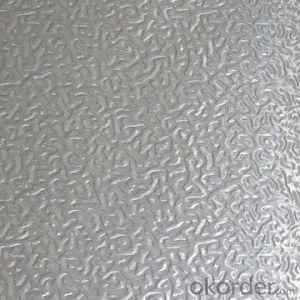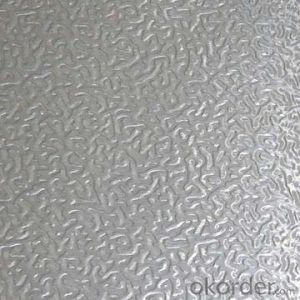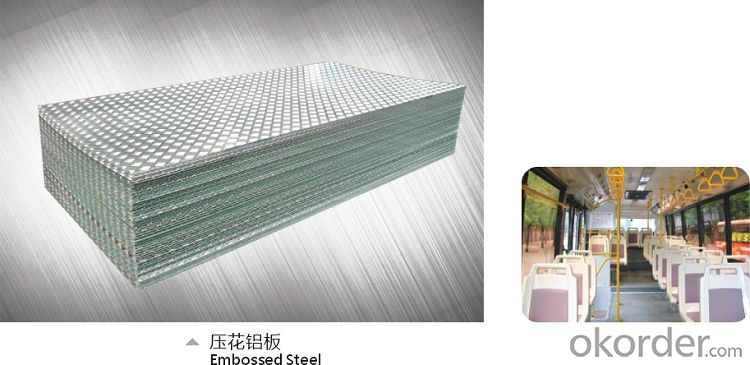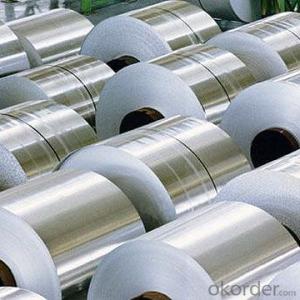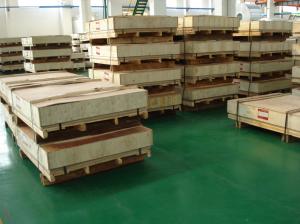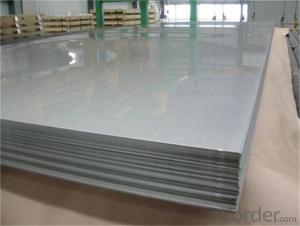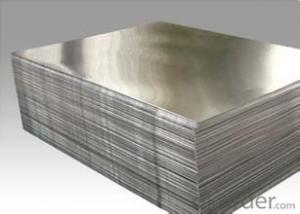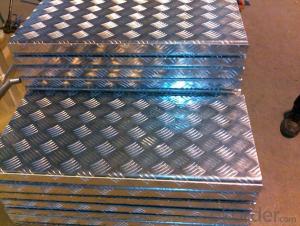Decorative Aluminum Sheets Canada - Aluminum Embossed for Any Use
- Loading Port:
- China Main Port
- Payment Terms:
- TT OR LC
- Min Order Qty:
- -
- Supply Capability:
- -
OKorder Service Pledge
OKorder Financial Service
You Might Also Like
We provide a full range of precision aluminum strip for almost any application. We produce aluminum strip in a wide variety of alloys, including clad composites. Our aluminum strip can be produced in standard dimensions or custom made to your special requirements. We produce both imperial and metric units. We manufacture in compliance with the main international specifications, and tighter tolerances or custom tempers are available upon request. We offer various surface conditions, custom finishes (painting, anodizing, embossing), special processing, and multiple packaging options to meet our customer's unique requirements. The following is a summary of our capabilities.
Manufactured in compliance with the main international specifications and standards, including: Aluminum Association, ASTM, EN, and DIN.
Manufactured in compliance with the main international specifications and standards.
Tighter tolerances are available upon request.Specifications
Aluminium alloys with a wide range of properties are used in engineering structures. Alloy systems are classified by a number system (ANSI) or by names indicating their main alloying constituents (DIN and ISO).
The strength and durability of aluminium alloys vary widely, not only as a result of the components of the specific alloy, but also as a result of heat treatments and manufacturing processes. A lack of knowledge of these aspects has from time to time led to improperly designed structures and gained aluminium a bad reputation.
One important structural limitation of aluminium alloys is their fatigue strength. Unlike steels, aluminium alloys have no well-defined fatigue limit, meaning that fatigue failure eventually occurs, under even very small cyclic loadings. This implies that engineers must assess these loads and design for a fixed life rather than an infinite life.
Another important property of aluminium alloys is their sensitivity to heat. Workshop procedures involving heating are complicated by the fact that aluminium, unlike steel, melts without first glowing red. Forming operations where a blow torch is used therefore require some expertise, since no visual signs reveal how close the material is to melting. Aluminium alloys, like all structural alloys, also are subject to internal stresses following heating operations such as welding and casting. The problem with aluminium alloys in this regard is their low melting point, which make them more susceptible to distortions from thermally induced stress relief. Controlled stress relief can be done during manufacturing by heat-treating the parts in an oven, followed by gradual cooling—in effect annealing the stresses.
The low melting point of aluminium alloys has not precluded their use in rocketry; even for use in constructing combustion chambers where gases can reach 3500 K. The Agena upper stage engine used a regeneratively cooled aluminium design for some parts of the nozzle, including the thermally critical throat region.
Another alloy of some value is aluminium bronze (Cu-Al alloy).
Aluminium foil acts as a total barrier to light and oxygen (which cause fats to oxidise or become rancid), odours and flavours, moistness, and germs, it is used broadly in food and pharmaceutical packaging. The purpose of aluminium is to make long-life packs (aseptic processing|aseptic packaging) for drinks and dairy goods, which allows storing without refrigeration. Aluminium foil containers and trays are used to bake pies and to pack takeaway meals, ready snacks and long life pet foods.
Aluminium foil is widely sold into the consumer market, often in rolls of 500 mm (20 in) width and several metres in length.It is used for wrapping food in order to preserve it, for example, when storing leftover food in a refrigerator (where it serves the additional purpose of preventing odour exchange), when taking sandwiches on a journey, or when selling some kinds of take-away or fast food. Tex-Mex restaurants in the United States, for example, typically provide take-away burritos wrapped in aluminium foil.
Aluminium foils thicker than 25 μm (1 mil) are impermeable to oxygen and water. Foils thinner than this become slightly permeable due to minute pinholes caused by the production process.
- Q: Are aluminum sheets suitable for artistic sculptures?
- Yes, aluminum sheets are suitable for artistic sculptures. Aluminum is a versatile material that offers several advantages for sculpting purposes. Firstly, it is lightweight, making it easier to handle and manipulate. This allows artists to create intricate and detailed sculptures without compromising on structural integrity. Additionally, aluminum is highly malleable, meaning it can be shaped into various forms and contours. This allows artists to experiment with different designs and achieve the desired artistic expression. Furthermore, aluminum is resistant to corrosion and weathering, making it ideal for outdoor sculptures. Its durability ensures that the artwork will withstand the elements and retain its aesthetic appeal over time. Additionally, aluminum sheets can be easily welded or joined together, enabling artists to create larger and more complex sculptures. Overall, aluminum sheets provide artists with a flexible and durable material that allows for creativity and longevity in their sculptural works.
- Q: What are the different methods of forming aluminum sheets?
- There are several methods of forming aluminum sheets, each with its own advantages and applications. Here are some of the different methods: 1. Rolling: Rolling is the most common method used to form aluminum sheets. In this process, a large aluminum ingot is passed through a series of rolling mills, which gradually reduce its thickness and increase its length. The ingot is rolled multiple times until the desired thickness is achieved. Rolling can produce aluminum sheets of various thicknesses and widths, making it versatile for different applications. 2. Extrusion: Extrusion is another method used to form aluminum sheets, especially for complex cross-sectional profiles. In this process, a heated aluminum billet is forced through a shaped die, resulting in a continuous length of aluminum with the desired shape. Extrusion allows for the creation of intricate designs and is often used in the production of structural components and frames. 3. Casting: Casting is a method used to form aluminum sheets with a specific shape or pattern. In this process, molten aluminum is poured into a mold and allowed to cool and solidify. The mold can be made of various materials, such as steel or sand, depending on the complexity of the desired shape. Casting is commonly used for decorative purposes and in the production of architectural panels. 4. Stretch forming: Stretch forming is a specialized method used to form aluminum sheets into curved or contoured shapes. In this process, the sheet is clamped at its edges and stretched over a form, using hydraulic or mechanical forces. As the sheet is stretched, it conforms to the shape of the form, resulting in a curved or contoured sheet. Stretch forming is commonly used in the aerospace and automotive industries for components such as fuselage sections and car body panels. 5. Pressing: Pressing, also known as stamping or punching, is a method used to form aluminum sheets into specific shapes or patterns. In this process, the sheet is placed between a die and a punch, and pressure is applied to deform the sheet. The die and punch can have various designs and can create shapes ranging from simple cutouts to intricate patterns. Pressing is commonly used in the manufacturing of automotive parts, appliances, and electronic enclosures. These are just a few of the different methods of forming aluminum sheets. Each method offers unique advantages and is chosen based on the specific requirements of the desired shape, thickness, and application of the aluminum sheet.
- Q: How much is the aluminum plate shearing machine?
- According to the model to decide, we'd better consult our manufacturers
- Q: Can aluminum sheets be used in marine environments?
- Yes, aluminum sheets can be used in marine environments. Aluminum is a commonly used material in marine applications due to its excellent corrosion resistance properties and lightweight nature. It can withstand the harsh conditions of saltwater, making it suitable for boat building, marine structures, and other marine-related uses.
- Q: How do you join two aluminum sheets together?
- One common method to join two aluminum sheets together is through welding. This involves melting the aluminum at the joint using various techniques like TIG (Tungsten Inert Gas) welding or MIG (Metal Inert Gas) welding, and then allowing it to cool and solidify, effectively fusing the two sheets together. Additionally, other methods like riveting, adhesive bonding, or using mechanical fasteners like screws or bolts can also be used to join aluminum sheets. The choice of method depends on the specific application and desired outcome.
- Q: Can aluminum sheets be used for heat lamps?
- Yes, aluminum sheets can be used for heat lamps. Aluminum has excellent thermal conductivity, which allows it to efficiently transfer and distribute heat. It is commonly used in heat lamps as it can withstand high temperatures and effectively radiate heat.
- Q: Are aluminum sheets resistant to saltwater corrosion?
- Yes, aluminum sheets are generally resistant to saltwater corrosion. Aluminum has a natural ability to form a protective oxide layer when exposed to air or water, including saltwater. This oxide layer acts as a barrier, preventing further corrosion and protecting the underlying metal. Additionally, aluminum is lightweight and durable, making it a popular choice for various marine applications such as boats, shipbuilding, and offshore structures. However, it is important to note that the resistance to saltwater corrosion can vary depending on the specific alloy and surface treatment of the aluminum sheets. Therefore, proper selection of the appropriate alloy and protective coatings can further enhance the corrosion resistance of aluminum sheets in saltwater environments.
- Q: What specific conditions are necessary for the storage and transportation of aluminum sheets to ensure their quality and safety?
- <p>Yes, there are special requirements for storing and transporting aluminum sheets. Aluminum sheets should be stored in a dry, cool place to prevent moisture and temperature extremes which can cause warping or corrosion. They should be stacked flat and evenly to avoid bending or denting. When transporting, aluminum sheets should be secured to prevent shifting during transit, which can lead to damage. Protective coverings may be used to shield the sheets from dirt, scratches, or other potential hazards. It's also crucial to handle the sheets carefully to avoid bending or denting, which can occur if they are not properly supported during transport.</p>
- Q: This question asks for the common types of aluminum sheet windows and doors that are available in the market.
- <p>Common types of aluminum sheet windows and doors in the market include sliding windows, casement windows, fixed windows, and awning windows. For doors, there are sliding doors, swing doors, folding doors, and automatic doors. Each type has specific features and applications, such as sliding windows being space-saving and easy to operate, while casement windows offer better ventilation. Sliding doors are popular for their smooth operation and minimal space requirement, and swing doors are traditional and widely used for their durability and security. These aluminum products are valued for their strength, durability, and low maintenance requirements.</p>
- Q: Are aluminum sheets suitable for chemical storage tanks?
- Depending on the specific requirements of the chemical being stored, aluminum sheets may be a suitable option for chemical storage tanks. Aluminum is renowned for its exceptional resistance to corrosion, making it well-suited for the storage of numerous chemicals. It develops a protective oxide layer that effectively prevents further corrosion, even in harsh environments. Nevertheless, it is vital to take into account the compatibility between the chemical and aluminum. Some chemicals, such as strong acids or bases, can react with aluminum, leading to corrosion or other undesirable reactions. In such instances, alternative materials like stainless steel or fiberglass-reinforced plastic (FRP) might be more appropriate. Furthermore, careful consideration should be given to the thickness and grade of the aluminum sheets, depending on the specific chemical being stored and the intended use of the tank. For highly corrosive or hazardous chemicals, thicker sheets may be necessary, while thinner sheets may suffice for less aggressive substances. In conclusion, aluminum sheets can be a viable choice for chemical storage tanks, provided that careful evaluation of chemical compatibility is conducted and the appropriate thickness and grade of aluminum are selected to ensure safe and reliable storage.
Send your message to us
Decorative Aluminum Sheets Canada - Aluminum Embossed for Any Use
- Loading Port:
- China Main Port
- Payment Terms:
- TT OR LC
- Min Order Qty:
- -
- Supply Capability:
- -
OKorder Service Pledge
OKorder Financial Service
Similar products
Hot products
Hot Searches
Related keywords
